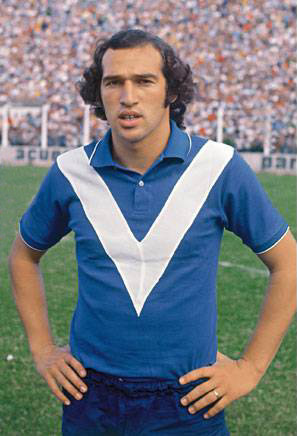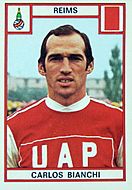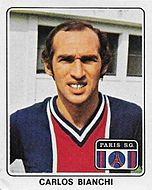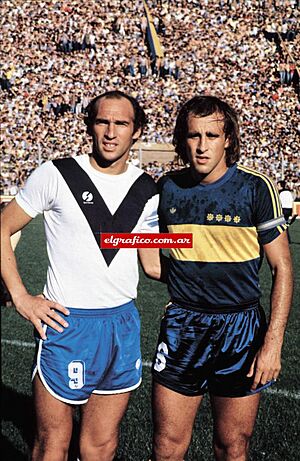Carlos Bianchi facts for kids

Bianchi with Vélez Sarsfield c. 1970
|
|||
| Personal information | |||
|---|---|---|---|
| Full name | Carlos Bianchi | ||
| Date of birth | 26 April 1949 | ||
| Place of birth | Buenos Aires, Argentina | ||
| Height | 1.78 m (5 ft 10 in) | ||
| Position(s) | Forward | ||
| Youth career | |||
| Unión de Paz | |||
| Ciclón de Jonte | |||
| 1960–1967 | Vélez Sarsfield | ||
| Senior career* | |||
| Years | Team | Apps | (Gls) |
| 1967–1973 | Vélez Sarsfield | 165 | (121) |
| 1973–1977 | Reims | 124 | (107) |
| 1977–1979 | Paris Saint-Germain | 89 | (76) |
| 1979–1980 | Strasbourg | 22 | (8) |
| 1980–1984 | Vélez Sarsfield | 159 | (85) |
| 1984–1985 | Reims | 18 | (8) |
| Total | 562 | (393) | |
| International career | |||
| 1970–1972 | Argentina | 14 | (8) |
| Managerial career | |||
| 1985–1988 | Reims | ||
| 1989–1990 | Nice | ||
| 1993–1996 | Vélez Sarsfield | ||
| 1996–1997 | Roma | ||
| 1998–2001 | Boca Juniors | ||
| 2003–2004 | Boca Juniors | ||
| 2005–2006 | Atlético Madrid | ||
| 2013–2014 | Boca Juniors | ||
| *Club domestic league appearances and goals | |||
Carlos Bianchi (born 26 April 1949) is a famous Argentine former football player and manager. People often called him El Virrey, which means The Viceroy.
He was a great player who scored many goals in Argentina and France. But Bianchi is even more famous as one of the most successful coaches ever. He led two big clubs, Vélez Sarsfield and Boca Juniors, to win many championships.
Bianchi is the only coach to win the Copa Libertadores four times. He also holds a record for winning three Intercontinental Cups. This record is shared with other top coaches like Josep Guardiola and Carlo Ancelotti. He last coached Boca Juniors. Both Boca Juniors and Vélez Sarsfield have built a statue to honor him.
Contents
About Carlos Bianchi
Carlos Bianchi was born in Buenos Aires, Argentina. He grew up in a regular family. In 1972, he married Margaret Mary Pilla. They have two children, Mauro Carlos and Brenda. He now has four grandchildren.
His father worked in sales, and Carlos often helped him. But his passion was football. He started playing for Vélez Sarsfield, the team he loved, and soon made his debut as a professional player.
When he was a coach for Vélez Sarsfield, a sports writer named Victor Hugo Morales gave him the nickname "Virrey" (viceroy). This was because Bianchi won many titles with Vélez Sarsfield, both as a player and a coach. The club is in the Liniers neighborhood, which reminded people of Santiago de Liniers, a viceroy who ruled the area in the early 1800s.
Playing Football: Carlos Bianchi's Career
Early Days and Becoming a Star
Like many Argentine football players, Bianchi started by playing "baby fútbol." This is a smaller version of futsal played by kids on smaller fields. When he was 11, Bianchi joined Club Ciclón de Jonte, which was connected to Vélez Sarsfield.
Someone from Vélez Sarsfield saw how talented Bianchi was. They invited him to play in the youth teams of Vélez Sarsfield. By the time he was 16, he was already playing in the third division.
Bianchi joined the main Vélez Sarsfield team when he was 18. His first game was a 1–1 tie against Boca Juniors. A year later, in July 1968, he scored his first goal against Argentinos Juniors. Just one week after that, Bianchi broke a long-standing record. He scored a goal that ended Amadeo Carrizo's amazing streak of 769 minutes without letting a goal in.
When he was only 19, Bianchi helped Vélez Sarsfield win the 1968 Nacional championship. He also became the top scorer in the 1970 Nacional championship with 18 goals. In 1971 Metropolitano, he scored an incredible 36 goals. Because he played so well, and another player was injured, Bianchi became the main forward for Vélez Sarsfield.
Playing in Europe
In 1973, Bianchi moved to France to play for Reims, a team in Ligue 1. In his first season, he was the top scorer in the league with 30 goals. One amazing moment was when he scored six goals in a 6–1 win against Paris Saint-Germain.
He got a serious injury in a friendly match against Barcelona. This made him miss some games. But after he recovered, Bianchi became the top scorer again. He scored 34 goals in 1975–76 and 28 goals in 1976–77.
During his time at Reims, Bianchi showed how good he was at scoring. He scored 107 goals in four seasons. He was the top scorer in the French championship in 1974, 1976, and 1977.
In 1977, he joined Paris Saint-Germain. He was the top scorer in the league again during his two seasons there. In his first season with Paris Saint-Germain, Bianchi scored 37 goals in 38 matches. He was also named the best player of the season. The next season, 1978–79, he was the top scorer again with 27 goals. Even with his amazing individual performance, PSG did not win any titles. Because of this, Bianchi decided to move to a stronger team.
When I was part of the team, PSG was a more modest team, with less attacking power. But despite that, I scored 37 goals in 38 league matches during my first season with the club. I had intuition, I knew where the ball was about to be. It's that being a scorer was my life.
In the 1979–80 season, he played for Strasbourg. He did not have as much success there, scoring only eight goals. Bianchi returned to Argentina in 1980 to play for Vélez Sarsfield. He became the top scorer in the 1981 season with 15 goals. He then went back to Reims and retired from playing in 1984.
Bianchi is the top scorer in the history of Vélez Sarsfield with 206 goals. He is also the 9th top scorer in the history of the French League with 179 goals. FIFA recognizes Carlos Bianchi as Argentina's top scorer in the history of first-division tournaments worldwide. He scored a total of 385 goals (206 in Argentina and 179 in France). This is more than Alfredo Di Stefano (377 goals) and Delio Onnis (352 goals). This is a huge achievement, but his coaching career is so famous that it often overshadows his playing days. Carlos Bianchi is the 8th top scorer in the history of first-division football.
He also played 14 games for the Argentina national team between 1970 and 1972, scoring 7 goals.
Back to Vélez Sarsfield
After playing in France, Bianchi came back to Argentina to play for Vélez Sarsfield. He was the top scorer in the 1981 Nacional championship with 15 goals. His last season in Argentina was in the 1984 Metropolitano. He played his final game for Vélez Sarsfield on July 1, 1984, a 1–2 loss to Boca Juniors. Bianchi is still the all-time top scorer for Vélez Sarsfield, with 206 goals in 324 matches.
Retiring in France
Bianchi returned to French football in 1984–85. He played for Reims, his first team in Europe, which was then in Ligue 2 (the Second Division). The team did not play very well, finishing 12th in their group. Bianchi was not scoring as many goals as he used to. He only scored eight goals that season. After that, he retired from playing football. However, Bianchi stayed at Reims and became the team's manager in the 1985–86 season.
Coaching Career
Coaching in France
Bianchi started his coaching career in March 1985 with Reims, the team he had just retired from. He coached them for three seasons in the Second Division. They did not get promoted to Ligue 1, but they did reach the semi-finals of the Coupe de France twice.
After Reims, Bianchi coached Nice in Ligue 1. He was in charge for 24 matches between 1989 and 1990. Nice stayed in the top division by beating Strasbourg in a playoff.
After leaving Nice, he went to Paris to coach Paris FC for two years (1991–92).
Coaching in Argentina
Bianchi returned to Argentina in December 1992 to coach Vélez Sarsfield. This was the club where he started his playing career. His first game as coach was on February 21, 1993. Vélez beat Deportivo Español 2–0. Vélez went on to win that championship, their second league title ever.
Because they were Argentine champions, Vélez qualified for the 1994 Copa Libertadores. They were in a tough group with strong teams like Boca Juniors and Brazilian clubs Cruzeiro and Palmeiras. But Vélez finished first in their group and moved to the next stage.
Vélez then beat Defensor, Minervén, and Atlético Junior. They reached the finals to play against the defending champions, São Paulo. Both teams won one game by the same score. So, they had a penalty shootout to decide the winner. Vélez Sarsfield won after their goalkeeper José Luis Chilavert saved a shot and Roberto Pompei scored. This was Vélez Sarsfield's first Copa Libertadores trophy!
The next step was the 1994 Intercontinental Cup. Bianchi led Vélez Sarsfield to win their second international title by beating Milan 2–0. Vélez continued to win two more league titles with Bianchi as coach. This became the most successful time in the club's history.
After a short time coaching the Italian club Roma, Bianchi came back to Argentina to coach Boca Juniors. He had two periods coaching Boca Juniors. During these times, he won four league titles, three Copa Libertadores titles, and two Intercontinental Cup titles. He became the most successful manager in Boca Juniors' history.
Career Statistics
Bianchi is known as one of the best forwards of all time. He scored many goals in both France and Argentina. He is the all-time top scorer for Vélez Sarsfield with 206 goals. He is also one of the all-time top scorers in the French Division 1 with 179 goals.
Player Statistics
| Club | Season | League | National cup | Continental | Total | |||||
|---|---|---|---|---|---|---|---|---|---|---|
| Division | Apps | Goals | Apps | Goals | Apps | Goals | Apps | Goals | ||
| Vélez Sarsfield | 1967–68 | Primera División | 3 | 0 | — | — | 3 | 0 | ||
| 1968–69 | 18 | 9 | — | — | 18 | 9 | ||||
| 1969–70 | 27 | 17 | — | — | 27 | 17 | ||||
| 1970–71 | 23 | 20 | — | — | 23 | 20 | ||||
| 1971–72 | 46 | 42 | — | — | 46 | 42 | ||||
| 1972–73 | 37 | 27 | — | — | 37 | 27 | ||||
| 1973–74 | 11 | 6 | — | — | 11 | 6 | ||||
| Total | 165 | 121 | — | — | 165 | 121 | ||||
| Reims | 1973–74 | Division 1 | 33 | 30 | 8 | 8 | — | 41 | 38 | |
| 1974–75 | 16 | 15 | — | — | 16 | 15 | ||||
| 1975–76 | 38 | 34 | 5 | 5 | — | 43 | 39 | |||
| 1976–77 | 37 | 28 | 7 | 10 | — | 44 | 38 | |||
| Total | 124 | 107 | 20 | 23 | — | 144 | 130 | |||
| Paris Saint-Germain | 1977–78 | Division 1 | 38 | 37 | 3 | 2 | — | 41 | 39 | |
| 1978–79 | 36 | 27 | 3 | 5 | — | 39 | 32 | |||
| Total | 74 | 64 | 6 | 7 | — | 80 | 71 | |||
| Strasbourg | 1979–80 | Division 1 | 22 | 8 | — | 3 | 3 | 25 | 11 | |
| Vélez Sarsfield | 1980–81 | Primera División | 9 | 5 | — | — | 9 | 5 | ||
| 1981–82 | 44 | 21 | — | — | 44 | 21 | ||||
| 1982–83 | 50 | 29 | — | — | 50 | 29 | ||||
| 1983–84 | 39 | 24 | — | — | 39 | 24 | ||||
| 1984–85 | 17 | 6 | — | — | 17 | 6 | ||||
| Total | 159 | 85 | — | — | 159 | 85 | ||||
| Reims | 1984–85 | Division 2 | 18 | 8 | — | — | 18 | 8 | ||
| Career total | 562 | 393 | 26 | 30 | 3 | 3 | 591 | 426 | ||
Manager Statistics
| Team | From | To | Record | ||||
|---|---|---|---|---|---|---|---|
| P | W | D | L | Win % | |||
| Reims | 1 July 1985 | 30 June 1988 | 114 | 53 | 27 | 34 | 46.5 |
| Nice | 1 July 1989 | 30 June 1990 | 38 | 9 | 13 | 16 | 23.7 |
| Vélez Sarsfield | 1 July 1993 | 30 June 1996 | 129 | 63 | 39 | 27 | 48.8 |
| Roma | 1 July 1996 | 7 April 1997 | 31 | 12 | 9 | 10 | 38.7 |
| Boca Juniors | 9 July 1998 | 31 December 2001 | 159 | 89 | 47 | 23 | 56.0 |
| Boca Juniors | 1 January 2003 | 4 July 2004 | 83 | 48 | 20 | 15 | 57.8 |
| Atlético Madrid | 1 July 2005 | 12 January 2006 | 21 | 6 | 8 | 7 | 28.6 |
| Boca Juniors | 1 January 2013 | 28 August 2014 | 53 | 22 | 13 | 18 | 41.5 |
| Total | 628 | 302 | 176 | 150 | 48.1 | ||
Awards and Achievements
As a Player
Vélez Sarsfield
- Primera División: 1968 Nacional
Stade de Reims
- Coupe de France runner-up: 1976-77
As a Manager
Vélez Sarsfield
- Primera División: 1993 Clausura, 1995 Apertura, 1996 Clausura
- Copa Libertadores: 1994
- Intercontinental Cup: 1994
- Copa Interamericana: 1994
Boca Juniors
- Primera División: 1998 Apertura, 1999 Clausura, 2000 Apertura, 2003 Apertura
- Copa Libertadores: 2000, 2001, 2003
- Intercontinental Cup: 2000, 2003
Individual Awards
- Argentine Primera División Top scorer: 1970, 1971, 1981
- French Division 1 Top Scorer: 1973–74, 1975–76, 1976–77, 1977–78, 1978–79
- French Division 1 Foreign Player of the Year: 1974
- South American Coach of the Year: 1994, 1998, 2000, 2001, 2003
- IFFHS World's Best Club Coach: 2000, 2003
See also
 In Spanish: Carlos Bianchi para niños
In Spanish: Carlos Bianchi para niños
 | Roy Wilkins |
 | John Lewis |
 | Linda Carol Brown |




